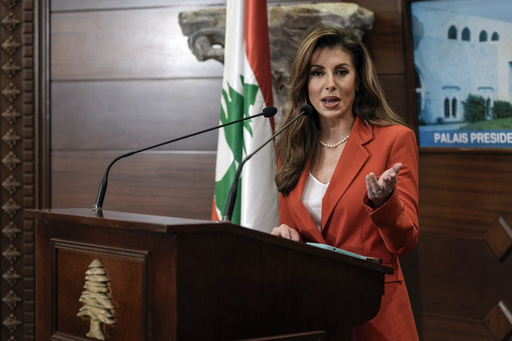
BEIRUT — A recently appointed U.S. envoy expressed optimism on Friday regarding the commitment of Lebanese authorities to ensure that the militant group Hezbollah does not play a role in the formation of the new government. Morgan Ortagus, a former spokesperson for the U.S. State Department and a member of the U.S. Navy Reserve, stepped into the role of deputy special envoy for Middle East peace, succeeding Amos Hochstein, who was instrumental in negotiating the ceasefire that concluded the prolonged conflict between Israel and Hezbollah.
During a press briefing held in Baabda, a suburb of Beirut, following her conversation with Lebanese President Joseph Aoun, Ortagus stated, “We are thankful to our ally Israel for its success against Hezbollah.” She acknowledged the involvement of President Aoun, Prime Minister-designate Nawaf Salam, and other officials in the government who are dedicated to combating corruption and implementing reforms, emphasizing their commitment to excluding Hezbollah from any governmental roles.
Ortagus outlined clear boundaries set by the United States, asserting that Hezbollah should not intimidate the Lebanese populace, particularly through participation in governmental affairs. “We will not permit Hezbollah to terrorize the people of Lebanon, and this includes any involvement in the new government,” she reiterated.
In reaction to Ortagus’s remarks, the Lebanese presidency released a statement on X, indicating that her comments reflected her personal views and were not a concern for the presidency. Meanwhile, Lebanese lawmakers nominated Nawaf Salam, a diplomat and former International Court of Justice judge, as the Prime Minister-designate, entrusting him with the formation of a government in a nation that has remained in caretaker mode since 2022.
Despite Salam’s intentions to create a government, progress has been arduous. Lebanon’s power-sharing framework, which divides critical positions among various sectarian groups—such as Hezbollah and the Amal Movement for the Shiites, and the Lebanese Forces for the Christians—has led to intense negotiations regarding ministerial roles. Both dominant blocs have been adamant about securing their share of influence.
Responding to Ortagus’s statements, Sheikh Ahmad Qabalan, the Jaafari Mufti and a prominent ally of Hezbollah, affirmed that the group serves as a vital representative force for Lebanon. He asserted, “Hezbollah has not been defeated and cannot be eliminated; sovereignty lies solely with Lebanon and its national entities, not under American influence or initiatives.”
He further cautioned that a government excluding both Hezbollah and the Amal Movement risks steering the country into uncertainty. Meanwhile, the deadline for Israel’s troop withdrawal from southern Lebanon, established under the ceasefire agreement, was initially set for January 26 but has now been postponed to February 18, with Hezbollah required to withdraw north of the Litani River to create a buffer zone free from non-state armed groups.
The Lebanese army, along with U.N. peacekeepers, is set to be deployed in the region. However, Israel has accused Lebanon of slow deployment, while Lebanon contends that Israel’s delays in withdrawing its forces have impeded their progress. The ceasefire is monitored by a U.S.-led International Monitoring and Implementation Mechanism, comprising representatives from Israel, Lebanon, France, and the United Nations Interim Force in Lebanon (UNIFIL). Still, Lebanon has accused Israel of numerous violations of the ceasefire.
During Ortagus’s meeting with President Aoun, an Israeli airstrike occurred in Sidon province, considerably north of the Litani River. The specifics of the target remain unclear, and the Israeli military has not provided immediate comment. The Israeli military stated on Thursday that they targeted “two military sites housing Hezbollah weaponry in violation of the ceasefire agreement.” Fortunately, no casualties were reported from Friday’s strike or from the array of airstrikes that impacted eastern and southern Lebanon the day before.

